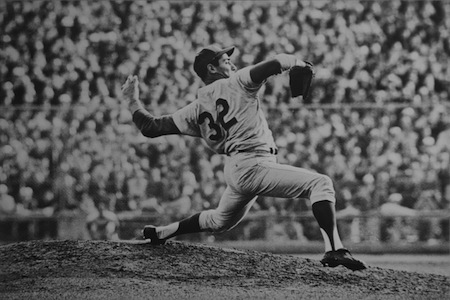On Jews and Baseball for the High Holidays

Sandy Koufax pitching in Game 7 of the 1965 World Series. Credit: Flickr/cliff1066.
 Most baseball fans know the story of Sandy Koufax not pitching the first game of the 1965 World Series because it was Yom Kippur. In 1934, future Hall of Famer Hank Greenberg made a similar decision, choosing to sit out a game to observe the holiday. Both of these decisions educated Americans about Jews. In fact, there was even a poem published in a Detroit newspaper about Greenberg sitting out the game:
Most baseball fans know the story of Sandy Koufax not pitching the first game of the 1965 World Series because it was Yom Kippur. In 1934, future Hall of Famer Hank Greenberg made a similar decision, choosing to sit out a game to observe the holiday. Both of these decisions educated Americans about Jews. In fact, there was even a poem published in a Detroit newspaper about Greenberg sitting out the game:
We shall miss him on the infield and shall miss him at the bat,
But he’s true to his religion — and I honor him for that!”
Greenberg and Koufax’s decisions also went a long way toward making Jews feel comfortable in America. Jews saw that Americans accepted a Jewish athlete’s decision to honor his religion and realized that they, too, could be accepted as Americans while simultaneously remaining true to their faith.
Greenberg, nonreligious as an adult but raised in an Orthodox home as a child, downplayed his decision this way in an interview that’s part of my new book, Jewish Major Leaguers in Their Own Words: Oral Histories of 23 Players:
Well, to me it was a question of two things. One was Yom Kippur is, you know, the Day of Atonement, and you’re supposed to put everything aside and just pray for the sins, atone for the sins of the year, that was one, and the other was respect for my parents. This is what they believed in, so naturally I would, out of respect for them, go along with not playing on Yom Kippur.
But important as these decisions were, decisions of whether to play or not play on the High Holidays were tougher for other players who weren’t as talented as Greenberg or Koufax. I want to focus on one of them for a minute: Jesse Levis.
Levis was a backup catcher who played for several teams during the 1990s. He was playing for Milwaukee in 1996 when he had a game scheduled on Yom Kippur:
I didn't tell my manager, Phil Garner, “Hey, I can’t play today. I’m Jewish.”
He had no idea. He just wanted to win the game, like any manager. I was fasting, too, and I wasn't drinking water; so, I was trying to keep things together.
In the seventh inning, I did get in the game. I went 0 for 3.
After the game, some reporter came in the clubhouse and knew I was Jewish, somehow put it together, and he said, “You played on Yom Kippur” and he started asking me questions.
I was like, “I’m not Sandy Koufax. I’m not at that level. I'm a major league player trying to make a living, make a career. I’m not the superstar,” which Koufax was, where he could walk in and say, “I can’t play today.” After the game, Bud Selig, who was our owner in Milwaukee at that time, who is now the commissioner, I guess he gave Garner some grief about it.
The next morning, Garner called me and apologized for putting me in the game.
It was nice that he did that anyway, apologized. God punished me anyway. I didn’t get a hit the rest of the year. We had, I think, maybe another week to go and I was 0 for 10 the rest of the year. He got me.
Levis’ dilemma was more typical of players than were Koufax or Greenberg’s predicaments. Unsure about their status, unsure whether their managers would understand, some players decided not to play, while other, like Levis, did. Even Greenberg, however, exalted for his Yom Kippur observance, chose to play in 1934 on Rosh Hashanah, another one of Judaism’s holiest days, after consulting with a rabbi. In this way, Jewish players were more like other Jewish Americans. Some U.S. Jews observe the High Holidays completely, including fasting on Yom Kippur, some do not, and others, like Greenberg, choose a partial observance.
Even those of us who are jaded about the big money and drugs that pervade today’s athletes like to make heroes out of past players. There’s a value to finding heroes, especially for our children, who need heroes to look up to, idolize, and in the best cases, emulate. It’s also important to look at players, even those in the past, as human beings who made imperfect decisions for imperfect reasons. Plus, it’s what history, whether it’s Jewish history, sports history, or personal or family history, is all about.
